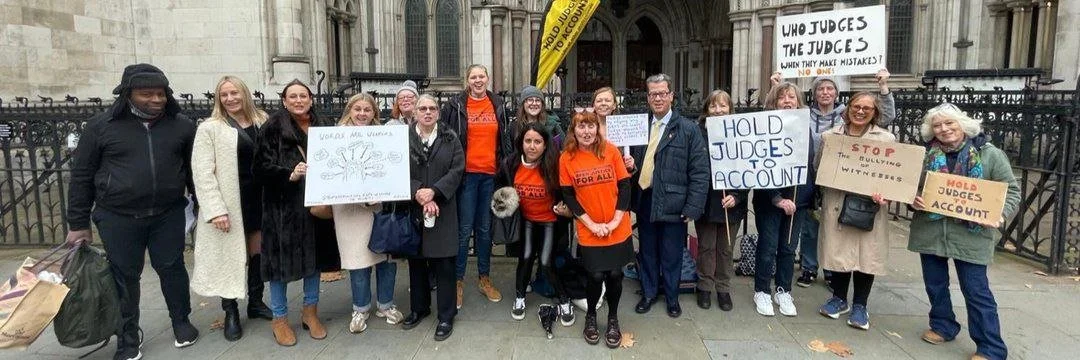Hold All Judges to Account
Victoria “DollyScoobs” - The Mother Demanding Judge Accountability
Victoria, known online as DollyScoobs, is the driving force behind the #HoldAllJudgesToAccount campaign - a grassroots movement calling for an independent, robust system of judicial accountability in England and Wales. Her mission is not to undermine judicial independence, but to ensure that trials are conducted fairly for both complainants and defendants, and that judges are accountable for legal errors and case management decisions that can significantly impact the outcome of a trial.
Her activism is deeply personal. In 2021, Victoria’s daughter, “G”, was in an abusive relationship. When the case finally came to trial after two years of waiting, G spent two harrowing days on the witness stand in her rape trial. What unfolded was, in Victoria’s words, “degrading and brutal.” She witnessed her daughter endure a relentless cross-examination that dragged private messages into open court, repeated them over and over, and leaned heavily on rape myths. The prosecuting barrister remained silent throughout, and G was left entirely alone in the face of this character assassination.
Shockingly, Victoria later learned that a Section 41 order (allowing certain sexual history evidence) had been granted to the defence the day before G’s testimony - but G was never informed, despite it being mandatory in law to do so. This meant she had no chance to prepare for the invasive questioning. Further investigation by a sympathetic criminal barrister revealed that up to 75% of the questions asked should never have been permitted, even under Section 41. In Victoria’s view, the judge’s failure to intervene amounted to a legal error - yet under current rules, judges cannot be formally reported for their handling of a case, only for misconduct in their personal behaviour.
Taking the Protest to Every Crown Court
These discoveries lit a fire under Victoria. In 2023, she set herself an ambitious goal: to protest outside all 69 Crown Courts in England within a year, carrying her distinctive yellow flag to demand that judges be held accountable for their case management and decisions. It was a protest born from grief, anger, and a fierce instinct to protect her daughter - an instinct someone once called “Mama Bear.” Victoria liked the description and has carried it forward, seeing herself as a mother determined to defend not only her own child but others facing injustice.
The experience was gruelling. Many days she stood for hours in freezing rain, often alone, sometimes ignored, sometimes challenged by security. There were moments of deep emotional exhaustion, including one day in Middlesbrough when she unexpectedly broke down in tears in front of a stranger who kindly stayed with her until she recovered. There were also moments of unexpected connection: mothers and daughters who had their own stories of injustice, students campaigning for better support for sexual violence survivors, and strangers who joined her, even briefly, in solidarity. These encounters reinforced the importance of visibility and conversation. Victoria realised that while the protests might not change the law overnight, they were sparking dialogue and solidarity in ways she hadn’t anticipated.
Why Judicial Accountability Matters
At the heart of Victoria’s campaign is a simple yet critical point: when judges make serious legal errors, such as allowing prejudicial questioning, failing to enforce trial safeguards, or ignoring statutory requirements, there is no independent mechanism for complainants or defendants to seek redress. The Judicial Conduct Investigations Office (JCIO) only investigates judges for personal misconduct, not for poor decision-making or bias in court. This means victims of legal errors have no recourse, even when those errors undermine the fairness of a trial.
For Victoria, this is not just about her daughter’s case. She has heard from families in both criminal and family courts who have been devastated by poor judicial decisions, with no recourse to hold those responsible to account. She believes that an independent oversight system - one that preserves judicial independence while ensuring fairness - is urgently needed.
While the campaign is personal, Victoria is clear that it must address the wider systemic problem. She’s had to navigate the balance between telling her own story and protecting her daughter’s anonymity, which limits her ability to attract traditional media attention. Nevertheless, her persistence and visibility - both outside court buildings and on social media - have made her a recognisable figure in the conversation about judicial accountability. Through this work, she has found renewed purpose and a sense of community. The campaign has been part of her own recovery from the trauma of her daughter’s trial, transforming depression into action.
Looking Ahead
Victoria’s immediate focus is on finalising her formal complaint to the Bar Standards Board about the prosecuting barrister in her daughter’s case. But she has now returned to her broader mission: pushing for judicial accountability “across the board.” She knows it’s a huge challenge, but she’s building her strategic approach, developing a clearer structure for her campaign, and drawing strength from the solidarity she’s encountered along the way.
Her message is clear: If judges can make serious legal errors that strip a trial of fairness, and nothing can be done about it, then justice itself is undermined. The #HoldAllJudgesToAccount campaign is her answer — a call for a fairer, more accountable justice system where no one is above scrutiny.
Protest, but make it joyful.










